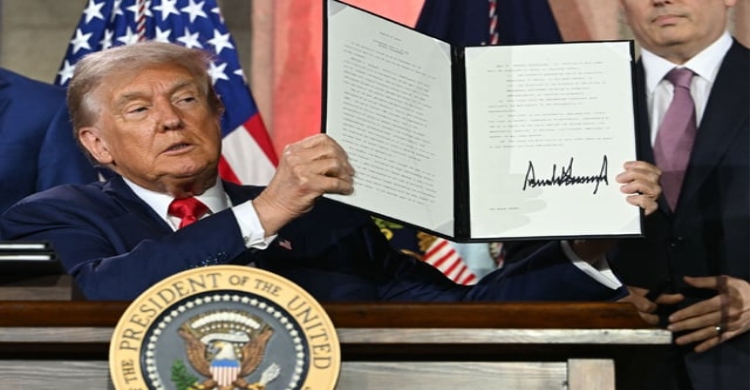Trump's first trade deals


South Korea on Wednesday became the latest exporter to complete a trade deal with the United States in a bid to limit damage from US tariffs taking effect on August 1.
The levies -- agreed by Britain, the EU, Indonesia, Japan, the Philippines and Vietnam -- are generally higher than the new base rate of 10 percent that the United States has applied to most countries since April.
But they are lower than the levels of customs duty the administration of US President Donald Trump threatened to impose on August 1 if no deal was reached.
While many details remain to be negotiated under the deals, the countries concerned made considerable concessions to the US.
- South Korea: 15 percent -
Trump said Wednesday that the United States will impose a 15 percent tariff on imports from South Korea, adding that Seoul will also invest $350 billion in return.
The deal struck is below a 25 percent rate that Trump had threatened earlier, and on par with US trade deals with Japan and the European Union.
Trump added that an additional unspecified "large sum of money" will be invested by Seoul, to be announced when South Korean President Lee Jae Myung visits the White House for a meeting within the next two weeks.
- EU: 15 percent -
Trump and European Commission President Ursula von der Leyen clinched a deal Sunday that includes a baseline US tariff of 15 percent in a bid to avert a full-blown trade war.
Trump said the 15 percent levy would apply across the board, including to Europe's crucial automobile sector, pharmaceuticals and semiconductors.
That is lower than the blanket 30 percent tariffs Trump had threatened to impose, but significantly higher than the duties in place to date.
As part of the deal, the 27-nation EU has agreed to purchase energy worth $750 billion from the United States and make $600 billion in additional investments, according to Trump.
He said EU countries -- which recently pledged to ramp up their defense spending within NATO -- would be purchasing "hundreds of billions of dollars' worth of military equipment."
The two sides have agreed to bilateral tariff exemptions on a number of "strategic products," notably aircraft, certain chemicals, some agricultural products and critical raw materials.
France's minister for Europe, Benjamin Haddad, said on Monday the agreement was "unbalanced" and Germany's BDI business federation said the accord would have "considerable negative repercussions."
- Japan: 15 percent -
Under the terms of the trade deal that Japan agreed to with Washington, the country's exports will be taxed at 15 percent instead of the threatened 25 percent rate.
Crucially, that reduction includes the tariff on automobiles, an industry accounting for 30 percent of Japanese exports to the United States in 2024.
Tariffs of 50 percent on Japanese steel and aluminium will continue to apply.
The White House said that under the deal, Japan would make $550 billion in investments in the United States.
Washington said it would retain 90 percent of the profits from these investments and Japan would buy $8.0 billion worth of US goods, including agricultural produce, aviation fuel and 100 Boeing planes.
- Philippines: 19 percent -
Under an accord announced by the White House, the Philippines obtained a tariff reduction of one percentage point on its goods entering the United States.
Products from the Southeast Asian country, a major exporter of high-tech items and apparel, will face a 19-percent levy.
- UK: 10 percent on average -
London and Washington concluded a deal in May under which a 27.5-percent tariff rate on cars dropped to 10 percent for the first 100,000 vehicles per year, a major win for Jaguar Land Rover.
The deal also benefits the British aerospace sector, in particular jet engine manufacturer Rolls Royce, which won a tariff exemption.
London is still negotiating exemptions for its steel and aluminium products from the 25 percent rate in force.
In return, the UK had to open its market further to US ethanol and beef, which has caused concern domestically.
The rest of Britain's products are subject to the 10 percent base rate.
- Vietnam: 20 percent -
Vietnam reached a deal in early July with the United States, its main export market for products including clothing and shoes.
The deal will see its shipments subject to a 20 percent tariff, instead of the threatened 46 percent rate.
But a 40 percent tariff will be imposed on goods manufactured in third countries that use Vietnam to circumvent steeper trade barriers.
US goods will not face any tariffs entering Vietnam.
- Indonesia: 19 percent -
Under a deal reached in mid-July, Indonesian exports to the United States will be taxed at 19 percent, lower than the threatened rate of 32 percent.
According to Washington, nearly all US goods will be able to enter Indonesia tariff free.
Moreover, it said Jakarta had agreed to recognise US standards for car and pharmaceutical imports.
Indonesia had already made other concessions earlier in July, pledging to buy more US oil and agro-industrial goods.
